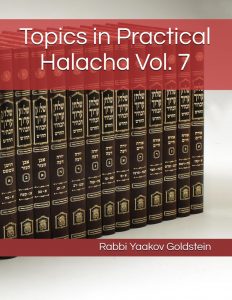*As an Amazon Associate I earn from qualifying purchases.
May one speak Hebrew in a bathroom [or Mikveh bathhouse]?[1]
It is permitted to speak of mundane matters in Lashon Hakodesh in a bathroom.[2] However it is an act of piety to be stringent [and avoid speaking Lashon Hakodesh at all in a bathroom, even of mundane matters].[3] [Some explain that this act of piety applies not only in a bathroom, but also to any area in which idolatry is found. Accordingly, it is understood why the language of Hebrew became forgotten in Europe, and the Jewish people became accustomed to speaking Yiddish. This was done purposely, in order to avoid speaking the holy language in a land filled with idolatry of the Christians, and since the language is no longer talked to the children, it eventually became forgotten.[4]]
Modern Hebrew: The Hebrew language spoken in Israel today, while similar to Lashon Hakodesh, is not considered Lashon Hakodesh in this regard.[5] Thus, modern Hebrew may be spoken in a bathroom.[6] [This especially applies with those whose mother tongue is Hebrew and is the main language in which they communicate, in which case it may be spoken in the bathroom, even if it were to be considered Lashon Hakodesh.[7]]
__________________________________________________
[1] Admur 85:2
[2] Admur ibid; Michaber 85:2; Abayey Brachos 24b
[3] Admur ibid; M”A 85:2; Sefer Chassidim 994 “An elderly man was asked, with what was your life lengthened? He responded that he had guests in his home and they spoke to him in the bathhouse in Hebrew, and I did not ever speak in the bathhouse or the bathroom even of mundane matters even though it is allowed, and since I made a fence and addition they added to me to my years”; Elya Raba 85:3; Soles Belula 85:2; Kaf Hachaim 85:11; M”B 85:9; Piskeiy Teshuvos 85:1
The reason: Some suggest that the reason for this avoidance is so one not come to accidentally recite Hashem’s name, or words of Torah in the bathroom. [Toras Chaim Sofer 84:3] Others suggest that the reason is because Lashon Hakodesh contains intrinsic holiness which should not be recited in an impure area. [Toras Chaim Sofer 84:3; Sheilas Yaavetz 10] Alternatively, the reason for its negation is because ideally Lashon Hakodesh is only to be used for speaking of Torah and service of God and not for mundane matters, which is one of the suggested reasons for why Yiddish was created and spoken instead of Hebrew. [See Igros Kodesh Rebbe Rashab 2:459] Now, since it is forbidden to speak of holy matters in the bathroom, therefore one should not speak in Lashon Hakodesh in a bathroom, as the only content that one can speak is mundane, which should not be spoken in Lashon Hakodesh.
[4] Hagahos Chasam Sofer on 85:2
[5] See Igros Kodesh of Rebbe Rayatz 3:560 and 4:12 who states that today, after all the innovations of words in modern Hebrew, it is no longer considered Lashon Hakodesh and hence the reasons behind avoiding speaking mundane speech in Hebrew [See Igros Kodesh Rebbe Rashab 2:459] is no longer applicable; Taharas Yom Tov 8:120; See also Sefer Hasichos 5703 p. 70;
[6] See Piskeiy Teshuvos 101 footnote 58
[7] See Afikei Maginim Biurim 85:2; Salmas Chaim 107 in implication of the Sefer Chassidim who implies that the act of piety only applies to someone who is fluent in another language and nonetheless chooses to speak Hebrew in the bathroom, in contrast to someone whose main language is Hebrew; Piskeiy Teshuvos 85 footnote 5


 Donate
Donate
Leave A Comment?
You must be logged in to post a comment.